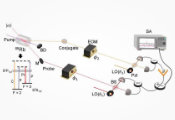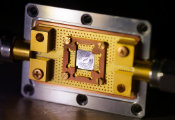Imec Technology Lights the Path to Utility Scale for Diraq’s Quantum Chips
LEUVEN (Belgium) and SYDNEY (Australia), September 24, 2025 -- Imec, a world-leading research and innovation hub in nanoelectronics and digital technologies, and Diraq, a pioneer of silicon-based quantum computing, have demonstrated that industrially made silicon quantum dot qubits consistently show error rates that surpass the values needed for quantum error correction. The results, reported in Nature, show that Diraq’s qubits can be manufactured reliably with the tools of the silicon microchip trade, confirming the potential of imec’s industrial manufacturing techniques for developing large-scale silicon-based quantum computers.
Leveraging nearly a decade of careful optimization and engineering of spin-qubit fabrication at imec, Diraq-designed devices were shown to consistently achieve over 99% fidelity in operations involving two quantum bits (or ‘qubits’). This feat, made possible by imec’s advanced spin qubit technology platform, is a crucial step in Diraq’s roadmap toward utility scale — the point at which a quantum computer’s value exceeds its cost.
Diraq’s CEO and Founder, Andrew Dzurak, said, “Achieving utility scale in quantum computing hinges on finding a commercially viable way of producing high-fidelity qubits at scale. Diraq’s collaboration with imec makes it clear that silicon-based quantum computers can be built by leveraging the mature semiconductor industry, which opens a cost-effective pathway to chips containing millions of qubits while still maximizing fidelity.”
Technical summary
The fidelity of a quantum operation quantifies how close the actual operation is to its ideal version and is a key metric for enabling large-scale quantum computers. Ideally, fidelities must (far) exceed 99% across all operations. Only then are errors rare enough for quantum error correction methods to work successfully. In this work, fidelities were reproducibly measured for a set of silicon quantum dot spin qubit operations across multiple devices state preparation and measurement of the qubits (SPAM), and one- and two-qubit gate operations performed on the qubits to control their state and entangle them — the elementary operations required for a utility-scale quantum computer. Fidelities above 99.9% were achieved for SPAM operations, and fidelities systematically exceeding 99% were shown for one- and two-qubit gate operations, making quantum error correction of industrially fabricated quantum dot qubit devices now a realistic prospect.
Typically, quantum devices fabricated in academic clean rooms are selected for measurement on the basis of their quality, a process that produces ‘hero’ devices, obscuring the reproducibility of the results. In the Nature publication, Diraq measured devices that were selected at random, obtaining reproducible data on sets of two-qubit devices, each consisting of a double quantum-dot structure. The devices were fabricated using imec’s 300mm spin qubit platform for silicon quantum-dot structures, which is optimized for low electrical noise and high uniformity. In order to also suppress the magnetic noise from residual nuclear spins in the substrate, the quantum-dot structures were fabricated on an isotopically enriched 28Si layer.
Kristiaan De Greve, fellow and program director for quantum computing at imec: “For the first time, silicon MOS based quantum-dot spin-qubit devices realized with industrial manufacturing techniques perform as well as academic hero devices. This shows that imec’s 300mm process flow for MOS based quantum-dot structures enables a low-noise qubit environment, resulting in high fidelity values for a set of critical qubit operations. The methods used and insights gained from it also show us that there is further room for fidelity improvement, as higher fidelities can be achieved through even further isotopic enrichment of the silicon-channel layer 28Si."




































